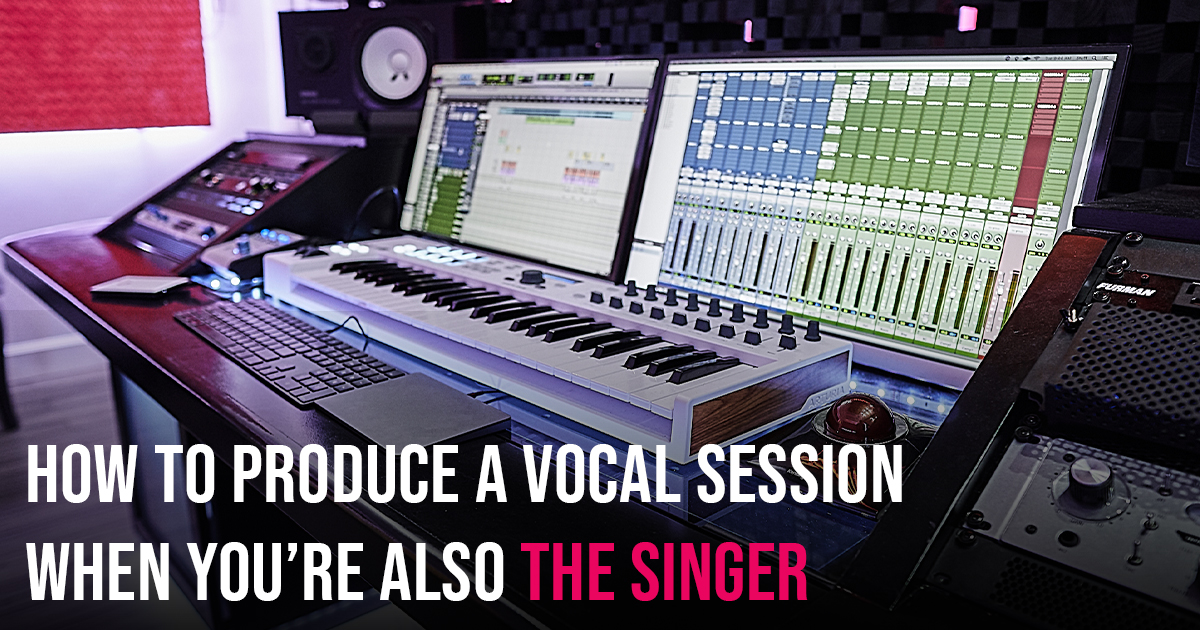How to Produce a Vocal Session When You’re Also the Singer

How to Produce a Vocal Session When You're Also the Singer
When you sing and compose, at the same time, you face a unique set of difficulties. But at the same time, the process also provides you freedom and a customized process.
Working with vocals is crucial. It can make or break a tune and for this reason, artists and producers work hard to capture vocals as perfectly as they can. The task becomes tougher if you're the producer as well as the singer. But with a few tips, you can perform the task easily and effectively.
Here's how you can combine your duties as a singer and engineer to create vocal tracks.
1. Find a comfortable place
Whether or whether you are the talent on both sides of the glass, while you are getting ready to produce a vocal session, aim to create a space that brings you the most comfort and the least headaches. Some folks will find that space in their bedroom, cellar, or even a peaceful field in the middle of nowhere. In any case, the more at ease you feel, the more you can concentrate on giving your singing and production your all. By doing this, you can avoid all kinds of distractions and barriers that may come while you are engaged during the artistic process.
2. Practice your music
Before you're up for your vocal session, make sure that you're ready with your music. Give your song as much thought as you can, come up with ideas (even if they're rough ones), and consider what you want to accomplish overall. You'll be more likely to produce vocal tracks that fit your song, enhance your music, and fill you with pride if you go into your session with more focus.
3. Use technology creatively
Get every aspect of your tech setup worked out before you start producing your vocal session. Unexpected gear problems are the worst thing that can go wrong during a vocal session, so having a recording setup that works well and efficiently right now is the best way to guarantee success. Additionally, since you are both the singer and producer, feel free to apply as many or as few effects to your monitor mix as you see suitable.
If recording fantastic recordings with only your own dry, immediate vocals will help, go for it. If you like to add layers of rich reverb to make it feel like you're in a gigantic stadium, give it a shot and see what happens. The only appropriate response is the one that motivates you to perform and record at your peak.
4. Get the session customized
While producing vocals, you may find that letting the singer perform from beginning to end without interruptions produces the best results. Other times, you may think that it's best to pick out specific verses or even phrases, record several takes of each, and then piece the song together after the fact.
For instance, you can begin with the verses, which require a warm and expressive vocal tone and sit lower in your register. You can also try the choruses, which are much higher pitched and intended to be soaring, after giving yourself a few takes of the two different verses. You'll be glad to structure your things this way, as, by the time you hit these more difficult parts, you will feel loose, warmed up, and well in the spirit of the song.
Whatever organizational strategy you believe will best position you for success, use it as you get ready to produce your vocal session. Give yourself the time to record as many full takes as you desire if you require seamless performances from beginning to end. Jump around to the portions that most excite you to work on them if you believe a divide-and-conquer technique will be more effective.
5. Take a break in between the sessions
Even though they are the same person, the producer will occasionally need to instruct the vocalist to take a break and regroup or the singer will need to inform the producer that a small pause is required. So, taking a break in the middle becomes crucial. You can also have snacks and drinks during those breaks and lessen your fatigue.
It's natural to want to push through and attempt to complete everything at once while you're in the flow. If you have the endurance and concentration for it, excellent, but keep your producer hat on and listen for the point at which your value as a singer starts to decline.
Conclusion
You have complete control over what happens and when you produce yourself as a performer, which is one of the best things about it. If you're not on a very tight schedule, end the session as soon as you feel your greatest vocal performances are behind you. Then, if necessary, you can take some time to listen back, assess, and plan your following vocal session.
ZOOM Recording Studio offers you several services related to music production, besides giving tips on how to achieve success in a music career.
For getting more tips on music creation, follow us.